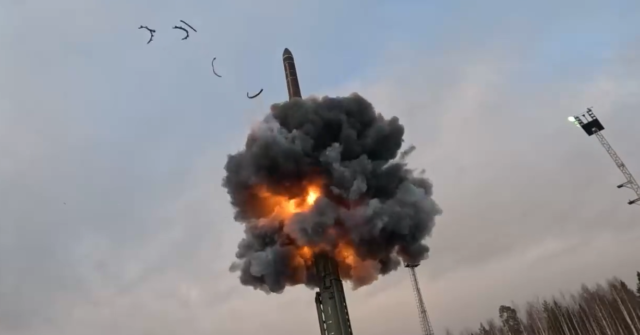The tension surrounding the ongoing conflict between Russia and Ukraine has reached a precarious new level with Ukraine alleging that Russia has launched an Intercontinental Ballistic Missile (ICBM) towards the Ukrainian city of Dnipro. If verified, this marks a significant escalation in hostilities, showing off Russia’s capabilities and intentions amid its ongoing military campaign. Reports indicate that early Thursday morning, Dnipro was targeted in what Ukraine has called a “massive attack,” which involved a combination of air-launched ballistic and cruise missiles, of which some were intercepted by Ukrainian defense forces. The situation continues to develop, with Ukrainian officials indicating that significant areas were impacted, including an industrial facility and a medical center.
The claims of an ICBM launch reportedly stem from the Astrakhan Oblast region adjacent to the Caspian Sea, although these assertions remain unverified by independent Western observers, with nations like the United Kingdom labeling the reports as unconfirmed. Russian officials have remained quiet on the matter, offering no acknowledgment of any ICBM strike, which has led analysts to interpret this as a potential strategy aimed at deterring further Western involvement in the conflict. Russia, in a show of force, appears to be using the alleged missile launch as a way to project its military power and intimidate nations that are supplying Ukraine with military aid.
The strike’s implications extend beyond immediate physical damage; it also represents a qualitative shift in the nature of the conflict. Ukraine has characterized the attack as a deliberate attempt to undermine critical infrastructure, highlighting that an airstrike near the Zaporizhzhia Nuclear Power Plant severed an essential power interconnector. This situation poses critical risks, as the loss of external power to the nuclear facility can result in catastrophic failures if not properly managed. The precarious status of this plant, which has been under Russian control for years, raises international alarm about the potential for a nuclear disaster in a volatile region, especially since the plant is operated by the Russian state nuclear energy corporation, Rosatom.
The alleged missile launch occurs against a backdrop of increasing military escalation and mixed signals from both sides regarding potential attacks on sensitive targets within each other’s territories. Following President Biden’s easing of restrictions around Ukrainian strikes within Russia, American and British-made missiles have been deployed, marking a significant change in the conflict’s dynamics. Russia has expressed that strikes within its borders by Ukraine—especially when fueled by Western munitions—could be regarded as acts of war, which raises the stakes for both parties involved. The Kremlin has historically engaged in nuclear posturing to dissuade Western involvement, and the high-stakes game of saber-rattling continues apace in this rapidly changing conflict.
The significance of nuclear capabilities in the geopolitical landscape cannot be overlooked. The launch of an ICBM—in this case, reportedly the Yars—serves as a reminder of Russia’s potent military arsenal, capable of striking targets thousands of miles away. During this period of heightened tension, both nations have engaged in strategic dialogue about the implications of military engagement, particularly with discussions surrounding the use of long-range missile systems. There have been overt acknowledgments from Russian leadership that they could ultimately leverage their nuclear arsenal in response to perceived escalations by Ukraine or its Western allies, suggesting a deeply integrated military strategy in this confrontation.
Within the context of regional security, neighboring countries like Poland are responding to these developments with utmost caution. Polish defense systems are on high alert, clearly reflecting concerns about Russia’s territorial ambitions. The operational readiness of Polish air defenses, alongside scrambles of fighter aircraft, underscores how events in Ukraine are resonating throughout Europe. As such, the conflict continues to evolve not just as a local struggle but also as a global concern with multilateral risks, potentially redefining security structures and alliances across the continent. The situation demands close observation as it unfolds, with significant consequences anticipated for the broader European and international landscape.

